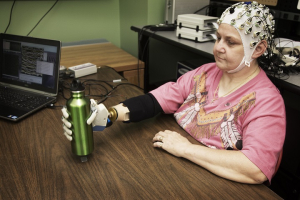The Building Reliable Advancements in Neurotechnology (BRAIN) Center, an Industry-University Cooperative Research Center (IUCRC) dedicated to bringing new neurotechnologies and treatments to market, is holding its third annual industry advisory board meeting Dec. 6-7, 2018 at the Hilton University of Houston, 4450 University Drive.
The agenda is chockfull of future innovations, strategies and goals of the collaborative enterprise.
The BRAIN Center, a collaboration among Arizona State University, the University of Houston and industry members, was officially funded in 2017 with a $1.5 million grant from the National Science Foundation. The mission of the BRAIN center – led by UH Professor Jose Luis Contreras-Vidal and ASU Professor Marco Santello – is to develop safe, effective and affordable personalized neurotechnologies.
Since its inception the center has attracted 10 industry partners, including companies Medtronic, the CORE Institute, Indus Instruments, 3Scan, GOGOA Mobility and Brain Products, as well as medical institutions such as the Phoenix Children’s Hospital, The Institute for Rehabilitation and Research Memorial Hermann Hospital and the Houston Methodist Research Institute.
The BRAIN’s Industry Advisory Board, co-chaired by Medtronic and Houston Methodist, have recently approved the Tecnologico de Monterrey – a top ranked private university in Mexico - as the first International BRAIN Site.
The center’s eight research areas include big data, clinical trials, device development, device interoperability, neural activity measurement, neuromodulation, neurorehabilitation and assistive device and regulatory science. Both invasive and noninvasive approaches form part of BRAIN’s neurotechnology portfolio.
In addition to engineering innovations, the BRAIN Site at the University of Houston hosts an annual Research Experiences for Undergraduates (REU) Site themed Neurotechnologies to Help the Body Move, Heal, and Feel Again, with the goal of inspiring participants to pursue graduate education and future engineering careers with technical leadership in the field of neural, cognitive and rehabilitation engineering.
Contreras-Vidal believes bringing together experts across this wide range of traditionally siloed fields will accelerate innovation of medical devices, diagnostic tools and treatments for a wide range of neurological conditions and diseases, which affect millions around the world.
Learn more about the BRAIN Center at https://nsfbrain.org/.
